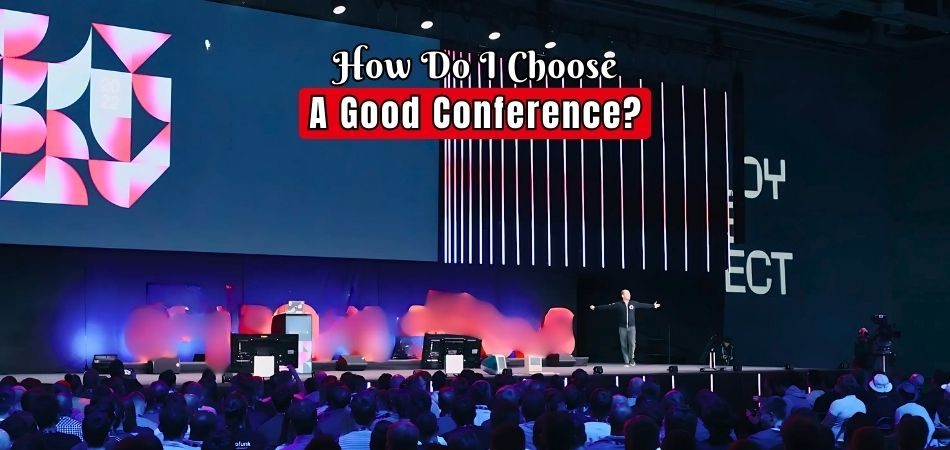Professionals gather at conferences to exchange ideas, present their research, and learn about recent developments in their field. They bring together people with similar interests to connect and grow. If you’re new to the conference world, you might be wondering, “How do I choose a good conference?”
Choosing a good conference starts with identifying your goals—whether you want to network, learn, or present your research. Research available conferences in your field, evaluate their reputations, and consider factors like location, agenda, and networking opportunities. This approach ensures you select an event that suits your goals and maximizes the value you gain from attending.
Are you curious about how to deal with the field of conferences? This article will provide you with detailed insights and essential information to help you make informed decisions about attending conferences that align with your professional aspirations.
Why Should I Attend a Conference?
Taking part in a conference can significantly boost your professional development and network. It provides an opportunity to learn about the latest trends and innovations in your field. Conferences also allow you to meet experts and peers, creating connections that can benefit your career.
Participating in conferences helps you gain new insights and perspectives. You can attend workshops and presentations that enhance your knowledge and skills. Engaging with speakers and other attendees can inspire new ideas and collaborations.
Conferences offer a platform to share your own work and receive feedback. Presenting your research or projects can increase your visibility in your industry. This experience can improve your communication skills and confidence.
If you’re interested in expanding your knowledge, consider looking into upcoming conferences in canada. Attending such events can open doors to international networking and learning opportunities. It’s a chance to connect with professionals from different backgrounds and explore new environments.
How Do I Choose a Good Conference?
To maximize your learning and networking opportunities, you should attend a good conference. With numerous options available, it’s crucial to select one that aligns with your interests and professional goals. Here are some steps to help you make an informed decision.
Step 1. Identify Your Goals
Start by determining what you want to achieve by attending a conference. Are you looking to network with industry professionals, gain new knowledge, or present your research? Clearly defined goals will guide your selection process, ensuring that you choose a conference tailored to your objectives. This clarity will help you focus on finding the right fit for your professional development.
Step 2. Research Available Conferences
Take the time to research conferences relevant to your field of interest. Utilize academic databases, professional associations, and online platforms to find upcoming events. Look for conferences that cover topics that connect with you and providing insights into emerging trends in your area of expertise. A thorough search will help you identify the most suitable conferences for your needs.
Step 3. Analyze the Reputation of the Conference
The reputation of a conference is vital for assessing its credibility. Investigate the organizing body and check past conference feedback. Reputable conferences typically attract quality speakers and offer insightful sessions, ensuring you gain valuable experiences and knowledge from attending. Look for reviews and testimonials from past participants to gauge the conference’s overall quality.
Step 4. Consider the Location and Format
Review the location and format of the conference. Is it being held in a place that is accessible for you? Additionally, consider whether the conference will be in-person, virtual, or hybrid. Choosing a format that suits your needs will enhance your overall experience, making it easier to participate and engage with the content presented.
Step 5. Look for Networking Opportunities
A significant benefit of attending conferences is the opportunity to network with peers and industry leaders. Research the networking activities planned for the event, such as workshops, social events, or panel discussions. A conference that encourages interaction will help you make valuable connections, developing relationships that can benefit your career and future endeavors.
Step 6. Check the Conference Agenda
Review the conference agenda to ensure it covers topics of interest to you. A well-structured agenda with diverse sessions can provide a rich learning experience. Check the list of speakers and panelists to see if they are reputable and relevant to your field. This will ensure you gain maximum value from the sessions you attend.
Step 7. Review Registration Costs and Funding Options
Consider the registration costs associated with attending the conference. Analyze whether the benefits of attending justify the expenses. Additionally, look for funding opportunities, such as scholarships or grants, that can help offset costs, making it more feasible for you to attend. Understanding the financial aspects will help you plan accordingly.
You need to carefully evaluate your goals, do thorough research, and evaluate various factors when choosing a conference. By following these steps, you can select a conference that offers valuable insights and networking opportunities to enhance your professional growth.
Why is a Dedicated Networking Session at Conferences Essential?
Taking part in conferences allows professionals to build connections, share ideas, and explore collaboration opportunities. A dedicated networking session enhances these opportunities by providing a focused environment. Let’s explore why such sessions are essential.
Facilitates Meaningful Connections
Dedicated networking sessions allow attendees to meet others with similar interests and goals. By engaging in these targeted interactions, participants can establish meaningful relationships that may lead to future collaborations or partnerships, enhancing their professional network significantly.
Encourages Collaboration and Idea Exchange
These sessions provide a platform for open discussions, enabling attendees to share insights and brainstorm solutions. This collaborative environment promotes innovation and creativity, as professionals from diverse backgrounds contribute different perspectives to common challenges.
Builds Long-Term Professional Relationships
Networking sessions help in building relationships that extend beyond the conference. By selecting the right conference with a strong networking focus, attendees can connect with individuals who can become long-term collaborators, mentors, or even friends in their professional development.
Increases Visibility in the Industry
Participating actively in networking sessions increases one’s visibility among peers and industry leaders. By sharing expertise and engaging in discussions, attendees can establish themselves as knowledgeable professionals, which may open up new career opportunities.
Provides a Comfortable Setting for Interaction
A dedicated networking session offers a relaxed atmosphere compared to formal presentations. This comfortable setting encourages attendees to engage openly, ask questions, and share experiences without the pressure of a formal audience, making interactions more genuine and productive.
Dedicated networking sessions are vital components of conferences, offering numerous benefits that enhance the overall experience. They facilitate connections, encourage collaboration, and contribute to professional growth, making them essential for any attendee seeking to maximize the value of the event.
How to Stay Updated on Upcoming Conferences?
For professional growth and networking, staying informed about upcoming conferences is essential. With countless events happening worldwide, finding the right ones to attend can enhance your career. Here are some effective strategies to keep you updated on conferences relevant to your field.
Follow Industry Associations and Organizations
Many professional associations and organizations host or promote conferences relevant to their fields. By following them on social media or subscribing to their newsletters, you can receive timely updates about upcoming events. These organizations often provide valuable resources and insights that can help you make informed decisions about which conferences to attend.
Use Online Conference Directories
There are various online directories specifically designed to list upcoming conferences. Websites like Conference Alerts or AllConferences offer comprehensive databases that you can search by date, location, and topic. Regularly checking these platforms ensures you don’t miss out on conferences that align with your interests and career goals.
Set Up Google Alerts
Creating Google Alerts for specific keywords related to your field can be an effective way to stay updated. Whenever new content appears online that matches your chosen keywords, you’ll receive an email notification. This can include announcements about upcoming conferences, ensuring you remain in the loop with minimal effort.
Join Professional Networking Platforms
Platforms like LinkedIn are excellent for networking and staying informed about industry events. Joining groups related to your field allows you to engage with other professionals who share updates about conferences. You can also follow influential figures who often share valuable information about events worth attending.
Attend Webinars and Online Events
Many organizations offer webinars and online events as a way to engage with their audiences. These sessions often include announcements about upcoming conferences and events. By participating in these virtual gatherings, you can gain insights and learn about opportunities that might not be widely advertised elsewhere.
By utilizing these strategies, you can effectively stay updated on upcoming conferences that align with your professional interests. Engaging with various resources and networks ensures you don’t miss valuable opportunities for learning and networking in your field.
Tips for First-time Conference Attendees
Taking part in your first research conference can be an exciting experience that offers a wealth of knowledge and networking opportunities. With proper preparation and a few strategic approaches, you can make the most of this pivotal career moment.
Research and Choose the Best Fit
Selecting the right event is critical, especially when selecting the right research conference that matches your goals and field of study. Consider the topics being covered, the reputation of the organizers, and the audience attending. The right choice will ensure the sessions you attend are highly beneficial to your growth.
Plan Your Schedule in Advance
Take time to review the conference schedule ahead of your visit. Prioritize the sessions, talks, and networking events that will be most relevant to your research interests. Proper planning helps you avoid feeling overwhelmed and ensures you make the best use of your time.
Prepare Your Materials Thoroughly
Whether you are presenting or just attending, preparation is key. If presenting, practice your presentation until it flows smoothly. Bring along copies of your research, a handful of business cards, and questions you’d like to ask. This will help you manage professional interactions comfortably.
Engage Actively During Sessions and Breaks
The sessions are valuable, but often the real gems are the people you meet. Take advantage of every opportunity to meet others in your field. Speak up during Q&A sessions, participate in workshops, and introduce yourself to speakers and fellow attendees to build lasting professional connections.
Reflect and Follow Up Post-Conference
After the conference, make sure to reflect on everything you learned. Review your notes and highlight ideas that apply directly to your work. Don’t forget to follow up with the contacts you made. A simple email can solidify connections and maintain the momentum you’ve gained.
Taking part in your first conference is an incredible learning experience. With thoughtful planning and active engagement, you can gain invaluable insights, make meaningful connections, and enhance your professional development throughout your academic and research journey.
Frequently Asked Questions
Selecting the right conference can be challenging, especially with so many options available. Here are some frequently asked questions to guide you through the process of choosing a conference that perfectly matches your goals and enhances your overall experience.
How Important Is Audience Type in Choosing a Conference?
The type of audience is crucial when selecting a conference. Choose an event where attendees share similar interests or work in the same industry. This helps you maximize networking opportunities and ensures the knowledge shared will be relevant to your career.
Should I Consider Speaker Profiles When Choosing a Conference?
Yes, reviewing speaker profiles helps determine the quality of the event. Conferences with credible and renowned speakers tend to provide high-quality sessions. Check their background and expertise to assess if their insights will be valuable to your learning experience and career objectives.
What Role Do Sponsorships Play in Conference Quality?
The reputation of a conference is often reflected in its sponsorships. High-profile sponsors typically indicate a well-organized event with valuable sessions. Research the sponsors supporting the conference, as reputable sponsors tend to collaborate with events that provide quality and relevance to attendees.
How Can I Measure the Practical Benefits of a Conference?
To determine practical benefits, look into what attendees gained from past events. This includes career advancement opportunities, skills acquired, or networking success. Testimonials or reviews can provide insight into the practical outcomes others have experienced, helping you decide if the event is right for you.
Should I Attend Conferences That Include Hands-On Workshops?
If you’re interested in improving specific skills, hands-on workshops can be extremely valuable. Conferences that offer interactive workshops allow you to apply learned concepts immediately, leading to a more comprehensive understanding. These practical sessions make the learning process more engaging and effective.
Final Thought
The experience of attending conferences can have a transformative effect on your professional development. These events offer unique opportunities to learn from experts, connect with peers, and explore new ideas in your field. By being proactive and prepared, you can maximize your participation benefits.
When considering “How do I choose a good conference?” It’s essential to clarify your goals first. Research available options that align with your interests and assess their reputability. Look for events with reputable speakers, relevant topics, and opportunities for networking. This approach will help ensure you select a conference that meets your professional aspirations.
Stay organized and open-minded as you go through the conference environment. Make a checklist of conferences that interest you, set deadlines, and participate actively. Best wishes as you make valuable connections in your field!








